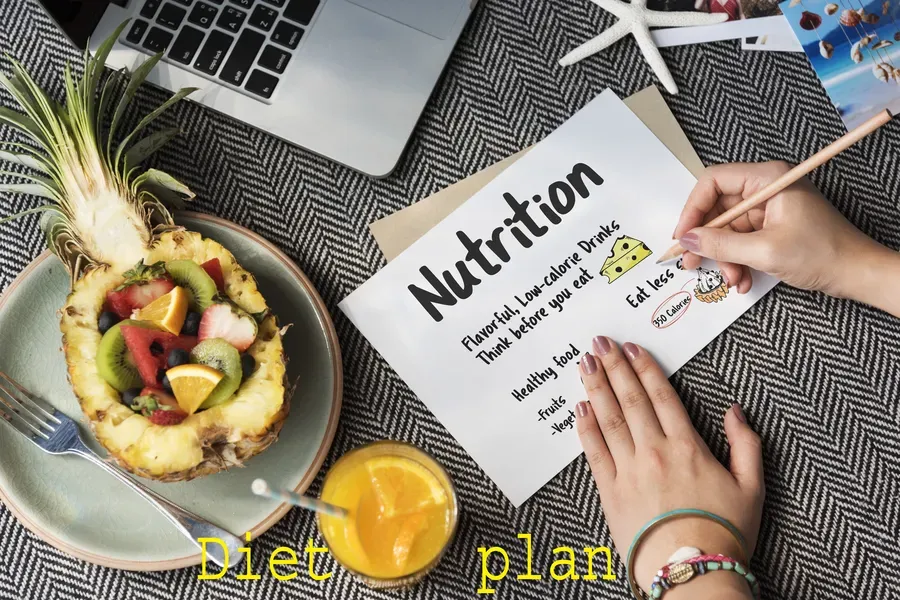Eating the right foods can boost your chances of getting pregnant. A well-planned diet may improve fertility and overall health.
The “30-Day Fertility Diet” focuses on nourishing your body with foods that support reproductive health. This diet includes whole grains, fruits, vegetables, healthy fats, and lean proteins. Each food choice plays a vital role in hormone balance and egg quality.
Following this diet for 30 days can help women and couples looking to conceive. It encourages mindful eating habits and helps eliminate processed foods that may harm fertility. In this blog, we will explore the benefits of this diet and share tips on how to get started. Making small changes can lead to big results on your journey to parenthood.
Fertility And Nutrition
Fertility is the natural ability to conceive. Nutrition plays a big role in this process. What you eat affects your health and fertility. A balanced diet helps your body work well. This can improve your chances of pregnancy. A 30-Day Fertility Diet focuses on foods that support fertility.
The Connection Between Diet And Fertility
Your diet influences your overall health. Poor nutrition can lead to problems with fertility. Some key points include:

- Balanced meals: Eating a mix of nutrients is vital.
- Healthy fats: Omega-3s can boost hormone levels.
- Vitamins and minerals: They support egg and sperm health.
- Whole grains: They help maintain stable blood sugar levels
Studies show that certain foods can enhance fertility. For example, fruits and vegetables are rich in antioxidants. These protect your cells from damage. A healthy diet can also reduce stress. Lower stress levels can improve your chances of conception.
Goals Of The 30-day Fertility Diet
The 30-Day Fertility Diet has clear goals. Here are some of them:
- Improve overall health.
- Support hormonal balance.
- Boost egg quality.
- Enhance sperm health.
- Reduce inflammation in the body.
This diet encourages eating whole, nutrient-dense foods. These include:
| Food Group | Examples |
| Fruits and Vegetables | Berries, spinach, carrots |
| Whole Grains | Quinoa, brown rice, oats |
| Healthy Fats | Avocados, nuts, olive oil |
| Lean Proteins | Chicken, fish, beans |
Following this diet can lead to better fertility outcomes. It promotes a healthier lifestyle. Making these changes can be beneficial.
Key Nutrients For Fertility
Nutrition plays a vital role in fertility. A balanced diet helps improve reproductive health. Certain nutrients are especially important for both men and women. These nutrients support egg and sperm quality. They also help maintain overall reproductive health.
Folic Acid And Its Importance
Folic acid is essential for fertility. It helps in cell division and DNA synthesis. Women need it for a healthy pregnancy. It reduces the risk of birth defects. Good sources of folic acid include leafy greens, beans, and fortified cereals.
Men also benefit from folic acid. It may improve sperm health. A diet rich in folate supports overall reproductive function. Aim for at least 400 micrograms daily.
The Role Of Omega-3 Fatty Acids
Omega-3 fatty acids are crucial for hormone production. They help regulate menstrual cycles in women. For men, they improve sperm motility. Omega-3s also reduce inflammation in the body.
Fatty fish, walnuts, and flaxseeds are good sources. Aim to include these in your meals. This can enhance fertility and support reproductive health.
Antioxidants For Egg And Sperm Health
Antioxidants protect your body from damage. They help improve egg and sperm quality. Vitamins C and E are strong antioxidants. They support healthy reproductive functions in both genders.
Fruits and vegetables are rich in antioxidants. Berries, citrus fruits, and nuts are great choices. Include a variety of colorful foods in your diet. This boosts your chances of conception.
The 30-day Diet Plan Breakdown
The 30-Day Fertility Diet aims to enhance reproductive health. Each week focuses on a different aspect of nutrition. Follow this plan to support your fertility journey.
Week 1: Cleansing And Preparing
The first week focuses on cleansing your body. This helps remove toxins. It’s essential for creating a healthy environment for conception.
- Drink plenty of water. Aim for 8-10 glasses daily.
- Include fresh fruits and vegetables. Choose organic when possible.
- Limit processed foods and sugars. Focus on whole foods instead.
Sample meals:
| Meal | Example |
| Breakfast | Green smoothie with spinach and banana |
| Lunch | Quinoa salad with mixed vegetables |
| Dinner | Grilled chicken with steamed broccoli |
Week 2: Nutrient-dense Foods Introduction
The second week introduces nutrient-dense foods. These foods improve overall health and fertility.
- Incorporate lean proteins like chicken, fish, and beans.
- Choose whole grains such as brown rice and quinoa.
- Consume healthy fats, including avocados and nuts.
Focus on these key nutrients:
- Folic Acid – Found in leafy greens and legumes.
- Omega-3 Fatty Acids – Present in fish and flaxseeds.
- Vitamin D – Get from sunlight or fortified foods.
Week 3: Balancing Hormones Through Diet
The third week aims to balance hormones. Proper nutrition supports hormonal health.
- Eat more fiber-rich foods like beans and whole grains.
- Limit caffeine and alcohol intake.
- Include foods rich in zinc, such as pumpkin seeds.
Sample meals:
| Meal | Example |
| Breakfast | Oatmeal topped with berries and nuts |
| Lunch | Spinach salad with chickpeas and feta |
| Dinner | Salmon with sweet potatoes and asparagus |
Week 4: Strengthening The Uterine Environment
The final week focuses on strengthening the uterine environment. Specific foods support uterine health.
- Eat foods rich in antioxidants like berries and dark chocolate.
- Incorporate fermented foods such as yogurt and kimchi.
- Stay hydrated to support overall reproductive health.
Sample meals:
| Meal | Example |
| Breakfast | Smoothie with yogurt and mixed berries |
| Lunch | Brown rice bowl with roasted vegetables |
| Dinner | Lentil soup with a side of whole-grain bread |
Foods To Focus On
Choosing the right foods can greatly impact fertility. Certain foods provide essential nutrients. These nutrients support reproductive health and hormonal balance. Here are some key food groups to include in your diet.
Leafy Greens And Their Benefits
Leafy greens are rich in vitamins and minerals. Spinach, kale, and Swiss chard are great choices. They contain folate, which is important for fertility. Folate helps in cell division and DNA synthesis.
These greens also have antioxidants. Antioxidants protect the body from damage. They help keep the reproductive system healthy. Eating a variety of leafy greens can boost your overall health.
Whole Grains For Hormonal Balance
Whole grains like brown rice and quinoa help stabilize blood sugar. They provide complex carbohydrates that release energy slowly. This balance is essential for hormone production.
Whole grains also contain fiber. Fiber aids digestion and helps maintain a healthy weight. A healthy weight is important for fertility. Incorporating whole grains can support your body’s needs.
Quality Proteins For Reproductive Health
Proteins are vital for building tissues and hormones. Focus on high-quality sources like fish, chicken, and legumes. These options are low in saturated fats.
Fish provides omega-3 fatty acids. Omega-3s support hormone production and improve blood flow. Legumes like lentils and beans offer plant-based protein. They are also rich in fiber and iron.
Choosing the right proteins supports overall reproductive health.
Foods To Avoid Or Limit
Eating the right foods can boost fertility. Certain foods can harm your chances of conceiving. Identifying these foods is essential for a successful fertility diet. Here are some foods to avoid or limit.
Reducing Processed Foods
Processed foods often contain unhealthy fats. They can lead to weight gain and hormone imbalance. Fast food, snacks, and frozen meals should be limited. These foods are low in nutrients. They also have high levels of preservatives and additives.

Focus on whole foods instead. Fresh fruits and vegetables are rich in vitamins. Choose lean proteins and whole grains. These options support overall health and fertility.
Limiting Sugar Intake
High sugar intake can disrupt hormone levels. It may lead to insulin resistance. This condition can impact ovulation. Cut back on sugary drinks and desserts. Read labels to find hidden sugars in foods.
Opt for natural sweeteners like honey or maple syrup. Use them sparingly. Fresh fruit can satisfy sweet cravings while providing nutrients.
The Impact Of Alcohol And Caffeine
Alcohol can affect fertility in both men and women. It may lower sperm quality and disrupt ovulation. Reducing alcohol intake is wise for couples trying to conceive.
Caffeine can also interfere with fertility. High caffeine intake may lead to complications. Limit coffee, tea, and energy drinks. Aim for no more than one cup a day.
Supplements To Consider
Considering a 30-Day Fertility Diet? Don’t forget about supplements. They can help fill gaps in your nutrition. Certain vitamins and minerals support reproductive health. Here’s what to know about supplements to consider.
When To Supplement Your Diet
Timing is key. Take supplements when:
- Your diet lacks certain nutrients.
- You are trying to conceive.
- You have specific health concerns.
Consult a doctor before starting any supplements. They can guide you on what to take.
Choosing The Right Vitamins And Minerals
Focus on these essential vitamins and minerals:
| Vitamin/Mineral | Benefits | Food Sources |
| Folic Acid | Supports cell division and reduces birth defects. | Leafy greens, beans, citrus fruits. |
| Vitamin D | Regulates hormones and improves fertility. | Fatty fish, fortified dairy, sunlight. |
| Omega-3 Fatty Acids | Enhances egg quality and hormone production. | Fish, walnuts, flaxseeds. |
| Zinc | Supports reproductive health in both men and women. | Meat, shellfish, legumes. |
Choose high-quality supplements. Read labels carefully. Look for third-party testing to ensure safety.
Lifestyle Changes To Complement Your Diet
Diet plays a key role in fertility. Yet, lifestyle changes can make a big difference too. Small adjustments can boost your chances of conceiving. Focus on exercise, stress management, and sleep. These factors work together with your diet.
Exercise And Its Effects On Fertility
Regular exercise benefits overall health. It can help maintain a healthy weight. A balanced weight is important for fertility. Both underweight and overweight can impact hormone levels.
Exercise improves blood flow. This can enhance reproductive health. Aim for moderate activities like walking, swimming, or cycling. These exercises are easy and enjoyable.
Stress Management Techniques
High stress can affect fertility. It can disrupt hormone levels and ovulation. Finding ways to manage stress is vital. Consider techniques like deep breathing, yoga, or meditation.
Spending time in nature can help too. Simple walks can clear your mind. Connect with friends and family for support. Talking can ease stress and improve your mood.
The Importance Of Sleep
Quality sleep is essential for good health. Sleep affects hormone levels and fertility. Aim for 7 to 9 hours of sleep each night. A consistent sleep schedule helps regulate your body.
Create a calming bedtime routine. Limit screen time before bed. Keep your bedroom dark and cool. These habits can improve your sleep quality.
Tracking Your Progress
Tracking your progress is key in the 30-Day Fertility Diet. It helps you see what works best for your body. Small changes can lead to big results. Keep an eye on your food choices and how your body reacts.
Keeping A Food Diary
A food diary helps you record everything you eat. Write down meals, snacks, and drinks. Note the time and portion sizes. This practice helps you spot patterns in your eating habits.
Review your diary weekly. Look for foods that boost your energy. Identify items that might not agree with you. Adjust your diet based on these insights.
Monitoring Fertility Signs
Pay attention to your body’s signals. Track your menstrual cycle. Note any changes in your ovulation patterns. Understanding these signs can help you identify your fertile days.
Consider using apps to help track your cycle. Some apps offer reminders and tips. This can make tracking easier and more accurate.
When To Seek Professional Advice
Consult a doctor if you have concerns. Seek advice if your cycle is irregular. Professional support can provide personalized guidance.
Discuss any difficulties you face while tracking your progress. A healthcare provider can help you create a plan that suits your needs.
Success Stories And Testimonials
Many couples have shared their journeys through the 30-Day Fertility Diet. Their stories inspire others. They show how diet changes can improve fertility. These testimonials highlight real results and hope.
People often seek advice from those who faced similar struggles. Success stories give comfort. They prove that positive change is possible.
Couples Who Improved Fertility Through Diet
John and Lisa struggled to conceive for years. They decided to try the 30-Day Fertility Diet. Within weeks, they noticed changes. Lisa felt more energetic and healthier.
After 30 days, they were thrilled. Lisa became pregnant. They credit their success to the diet. It helped them focus on nutrition and health.
Another couple, Mark and Sara, faced challenges too. They joined the program and committed fully. They replaced processed foods with fresh fruits and vegetables.
After a month, they saw amazing results. Sara’s cycle became regular. They welcomed a baby girl soon after. Their story shows the power of diet.
Lessons Learned From The 30-day Journey
Many couples learned valuable lessons during their journey. Nutrition plays a key role in fertility. Eating whole foods can improve overall health.
Portion control also mattered. Many found that smaller meals helped. This change led to better digestion and energy levels.
Staying consistent was important. Couples who stuck to the plan saw results. They learned to read labels and choose wisely.
Support from each other made a difference. Sharing the journey strengthened their bonds. They felt less alone in their struggles.
Preparing For What’s Next
Completing the 30-Day Fertility Diet is just the beginning. The changes you made can pave the way for a healthier future. As you prepare for what’s next, focus on maintaining these habits. They can support your journey toward pregnancy and beyond.
Continuing Healthy Habits Post-diet
After the 30 days, keep the healthy habits alive. Continue eating whole foods. Fresh fruits, vegetables, and lean proteins should stay on your plate.
Hydration is key. Drink plenty of water each day. This helps your body stay balanced and nourished.
Regular exercise is important too. Aim for at least 30 minutes of activity most days. This boosts your mood and supports your overall health.
Consider keeping a food journal. Write down what you eat and how it makes you feel. This can help you stay accountable.
Transitioning To A Pregnancy-supportive Diet
As you move forward, adjust your diet to support pregnancy. Focus on iron-rich foods. Lean meats, beans, and leafy greens are great choices.
Include healthy fats in your meals. Avocados, nuts, and olive oil provide essential nutrients.
Don’t forget about folic acid. This nutrient is vital for a healthy pregnancy. Foods like fortified cereals and legumes can help.
Listen to your body. Pay attention to hunger and fullness cues. This helps you create a balanced approach to eating.
Final Thought
A 30-day fertility diet can help improve your chances of conception. Focus on whole foods like fruits, vegetables, and healthy fats. Stay hydrated and limit processed foods. Remember, small changes can make a big difference. Consult a doctor or nutritionist for personalized advice.
Eating well supports your overall health, which is important for fertility. Stay positive and patient throughout your journey. Nourish your body and mind. With dedication and care, you can take a step closer to your goals. Your path to parenthood starts with good nutrition

